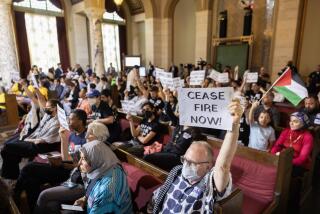Muslims, Jews Sign Agreement
- Share via
With slow, painstaking pen strokes, 20 Jewish and Muslim leaders Monday put their signatures on a document they hope will help bring their two communities closer together.
The code of ethics calls for Muslim and Jewish leaders to meet regularly to talk over important issues and to immediately and publicly repudiate any group or institution that appeals to prejudice, hate or violence.
Most of the Jewish leaders signing the code were liberal rabbis. Leaders of the area’s largest Jewish organizations had already said they don’t plan to participate because, they assert, the Muslim leaders involved have failed to condemn past terrorist killings.
“I have worked to bring about the day when documents of this sort could be signed in good faith, and I am disappointed that it’s being signed as it is today, by co-signers who have not lived up to the statement as it exists,” said Rabbi Gary Greenebaum of the American Jewish Committee.
Those who did sign pledged to refrain from stereotyping or making sweeping generalizations about each other and to verify rumors and reports with each other before making public pronouncements.
“Here in L.A., Muslim and Jews are neighbors,” said Rabbi Alice Dubinsky, the acting director of the Union of American Hebrew Congregations’ Pacific Southwest Council. “We can no longer cling to fear and prejudices.”
Signers, many toting cameras to record the historic event, said they hope that their Los Angeles-based effort will lead to national and even international forums.
Standing shoulder to shoulder in City Hall, Rabbi Allen Freehling of University Synagogue and Maher M. Hathout, an Egyptian-born cardiologist and local Muslim leader, said Jews and Muslims must find “common ground” and a “common political language.”
It was Hathout, who, with Salam Al-Marayati of the Muslim Public Affairs Council, first proposed the code last year only to see it scuttled and then resurrected with the help of rabbis such as Freehling and Dubinsky.
Hathout and Al-Marayati both dismissed charges that they condone terrorism.
“That interpretation is wrong,” Hathout said.
When pressed by a representative from a counter-terrorism journal, Al-Marayati said he and many American Muslims have a critical attitude toward the Israeli government, but do not condone terrorism.
At the fledgling group’s first meeting sometime in January, leaders said, they will tackle the often tricky issue of the United States’ policies against terrorism.
The current approach is fatally flawed, said Al-Marayati, because it does not include enough Muslim voices and because investigators often rush to blame Muslims for
apparent acts of terrorism in the absence of evidence, such as in the first hours after the 1995 bombing of the Oklahoma City federal building.
Joe Hicks, executive director of the Los Angeles City Human Relations Commission, hosted the signing ceremony. He beamed as he stepped forward to sign the document, which was hand-scripted and digitally colored an aged brown. “We almost ran out of room [on the paper], which is a good thing,” he said.
Hicks said he hopes that Jewish leaders such as Greenebaum will eventually come around and join the group. “My God, if [Yasser] Arafat and the leadership of the state of Israel can broker a peace settlement, then it seems logical and sensible that people right here at home can began to reach across the table,” he said.
More to Read
Sign up for Essential California
The most important California stories and recommendations in your inbox every morning.
You may occasionally receive promotional content from the Los Angeles Times.













